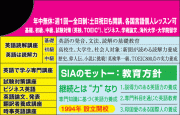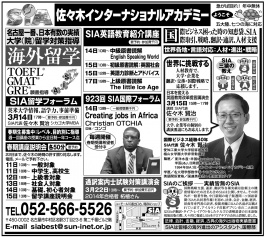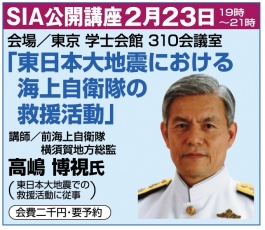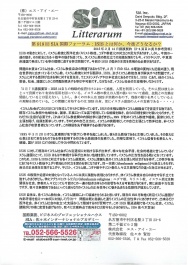2009.11.01
11月新講座紹介:経済学(英語専門講座:マイクロ、マクロ経済学、経済学史)、論語、唐詩選で学ぶ中国語講座
佐々木インターナショナルアカデミーは11月より新講座をSemester制度(11月-3月、毎月4回計20回)で開講します。
先ず英語専門講座として経済学(マイクロ、マクロ)を木曜日午後7-8時半、授業料は10万、教材(本代5-6千円)は米国大学使用教科書使用、講師は佐々木です。経済学史(経済思想史)は火曜日午後7-8時半、授業料10万円、教材(本代5-6千円)は米国大学使用教科書使用、講師はMr. Rich Porter氏です。その他、英語講座としては英語初心者対象、基礎読解、発音矯正講座を火曜日午前中10時半-12時、授業料は8万、教材費1,730円です。
中国語講座は、論語、唐詩選で学ぶ中国語講座として月曜日午後7-8時半、又は日曜日午前10-11時半で開講します。授業料は20回5万円です。中国語の教育についてこれまでの試行錯誤から、重要な発音を如何に教えるかに行き着いた新しい教育方法です。
11月の新講座紹介のため11月3日の文化の日午後1時より説明会を開催します。又11月7日の第665回SIA国際フォーラムは経済学の父、アダムスミスを取り上げますので参加下さい。上記新規講座は何れも3名以上を原則として開講いたします。受講希望の方は至急連絡下さい。
佐々木 賢治
SIA Inc. Sasaki International Academy
国際ビジネス、翻訳、通訳、語学教育のご相談は
国際ビジネスのプロフェッショナルハウスSIA!
佐々木インターナショナルアカデミーへ!
**********************
国際ビジネス、語学のプロフェッショナルハウス
佐々木インターナショナルアカデミー
453-0015 名古屋市中村区椿町17-15
ユース丸悦ビル5階
Tel 052-452-5526 Fax 052-452-5536
siabest@sun-inet.or.jp
http://www.sasaki-international-academy.com/
★ 語学教育、翻訳・通訳、国際ビジネスはSIA ★
**********************
2009.10.30
第664回SIA国際フォーラム10月31日午後1-2時半 68年前の日米交渉
先日公開しました「091023-SIA評論:65回目の敗戦記念日に思う、裸の王様 第三回:大本営陸海軍部発表。帝国陸海軍は今8日未明西太平洋において米英軍と戦闘状態に入れり」について様々なご意見、反響を戴き有難う御座います。
皆さんの関心の高さに驚かされました。この原稿を書くにあった手は膨大な資料を調べました。しかし、SIA評論の定期購読者、及びSIA会員の皆さん以外には個別のご質問にはお答えしていませんので了解下さい。
この声にを受け明日土曜10月31日上記記事に関し、急遽下記講演会を開催する事に致しました。
第664回SIA国際フォーラム
10月31日午後1時-2時半(英語講演)
68年前の日米交渉:対米宣戦布告文:
Japanese Note to The United States December 7, 1941,
Generally referred to as the “Fourteen Part message
講演者 佐々木 賢治
参加費 2千円(要予約)
今回の一連の記事(裸の王様 第1-3回)は現在の日本社会の閉塞感、問題点を指摘し改善するために書いたものですが、明日の講演は、米国の名門イェール大学の資料を基に英語で行ないますが、現在日本国や日本企業が抱える対外交渉についても大変参考になる事例です。因みにその英文はSIAの判断基準では一箇所ミスがある事を除けば英語として正確ですが、格調の高さは伺えないと評価しています。
佐々木 賢治
SIA Inc. Sasaki International Academy
追伸:SIAでは翻訳、通訳、データ検索サービス、対外交渉戦略立案、指導も行なっています。
国際ビジネス、翻訳、通訳、語学教育のご相談は
国際ビジネスのプロフェッショナルハウスSIA!
佐々木インターナショナルアカデミーへ!
**********************
国際ビジネス、語学のプロフェッショナルハウス
佐々木インターナショナルアカデミー
453-0015 名古屋市中村区椿町17-15
ユース丸悦ビル5階
Tel 052-452-5526 Fax 052-452-5536
siabest@sun-inet.or.jp
http://www.sasaki-international-academy.com/
★ 語学教育、翻訳・通訳、国際ビジネスはSIA ★
**********************
2009.10.24
英国大学院留学生のロンドン報告
カテゴリー: 佐々木インターナショナルアカデミー
英国大学院留学生のロンドン報告
佐々木インターナショナルアカデミーの皆さんお元気ですか? 正式に大学院に入ってから約1カ月が経ち、ようやくこちらでの生活や授業にも少しですが慣れてまいりました。少しですが、最近の生活についてご報告したく、メールいたしました。
日々、ひたすら膨大な量のリーディングに向き合い、毎日が時間との戦いです。私が属する大学院の専攻部門(Marketing)では主要な授業が一学期に対して4科目、それぞれ2時間、そして各授業に、毎週1時間ずつのゼミがついています。その上、毎週4時間(2時間×2コマ)留学生は、語学の授業が受けられます。私は、ライティングの授業とプレゼンの授業をとりました。
以前、先生にもご指摘いただきましたが、ライティングの授業で大きく取り扱われているのがPlagiarism対策です。規定も事細かく、大変厳しいので、夏の入学準備講座しかり、今のライティング講座しかり、授業の大部分で、どのようにReferenceを書くか、Plagiarismと判断されない為の許容範囲はどこまでなのかといった内容が扱われています。
ビジネスコースのクラスメイトは留学生が大部分を占め、中国人やインド人が最も多く、トルコ、アメリカ、ロシア・カザフスタン人の留学生も多くいます。International Marketingの授業の際には、『私の国では・・・・』といった多様な意見が多く、非常に刺激的です。因みによく発言するのはインド人です。ベトナム人のクラスメイトは勤勉で、中国人のクラスメイトも友好的で、ロシア人のクラスメイトは大変親切です。
私は他の学生より、喋ることに関して大変劣るため、ゼミ内での発言機会を得ることに対して、大変ネガティヴになっていましたが、最近小さな発見がありました。とても簡単な解決策だったのですが、それは『たくさんリーディングをこなし、できるだけしっかりと準備する』ことでした。ゼミにおいて、議論が行き詰った時、必ず発言できる機会が訪れます。そのような場合、下手な英語や下手な説明でも、みんなはしっかり理解しようとしてくれるようです。
まだまだ、恥ずかしながらやっと授業についていっている状態ですが、毎日、時間や課題に追われながらも大変楽しく過ごしています。最近は少し読むスピードも速くなった気がします。そして何といっても、ロンドンでマーケティングの勉強ができることに関して、大変嬉しく思っています。
ロンドンという町にも、とても魅力を感じています。数多くの博物館、美術館があり、中にはブランド・広告歴史博物館、シティには銀行やお金にまつわる博物館まであります。また、余裕がでてきたら、この1年間少しでも足を運びたいと思います。
ちなみに、純粋なイギリス人の中には、日本に興味を持っている人が多くいるようです。日本から来たというと、非常に興味を示してくれ、いろいろ質問されます。8月終わりの選挙戦についても、選挙の始まる数日前から、FINANCIAL TIMESは紙面を大きく割いて特集記事を組んでいました。準備コースでプレゼンを行った際、私はLDP、DPJの違いと『Iron−Triangle』について講演しました。準備コースの先生に大変良いトピックだと褒められ、他の生徒からもたくさん質問をもらい好評でした。これも、佐々木先生の『自分の強みで勝負せよ』という教えのおかげです。ありがとうございました。
こちらは寒くなってまいりましたが、先生はお元気でいらっしゃいますか。また、出来れば写真などもつけて改めてご報告を送りたいと思います。今日はここで失礼いたします。
HN from London
2009.10.23
佐々木インターナショナルアカデミー英語専門講座:米国史第22回 Start of the Great Depression 講師:Rich Porter 受講資格 SIA英語評価基準中級レベル
カテゴリー: 佐々木インターナショナルアカデミー
米国史は1年間を通じた90分授業、40回の講義です。次の資料は事前のreading assignmentです。その他、英国史、日本史、世界史、経済、要望に答えほとんどどんな課目でも英語でネイティブが教えています。当校の教育で一番力を入れているのが正確な読解力養成と発音です。世界を目指すビジネスマン、スポーツ選手、芸術家、学者が学ぶ名古屋駅から大変便利な場所にある佐々木インターナショナルアカデミー。他言語も同様な教育を進めています。
The start of the Great Depression represents the focus for next Saturday's lecture. The lecture will be both general and specific. Thus, please note the areas below.
1. Overview: Before and After 1930
2. The Hawley-Smoot Tariff
3. Hoover: From 1929 Crash to FDR's Inaguration
Overview: Before and After 1930
During most of the 1920s, the United States enjoyed a period of unbalanced prosperity: farm prices and wages fell, while new industries, and industrial profits grew. The boom was fueled by an inflated stock market, which later led to the a crash on October 29, 1929. The results of the Hawley-Smoot Tariff, the Dust Bowl, and the ensuing Great Depression, led to government efforts to restart the economy and help its victims with Franklin D. Roosevelt's New Deal. The recovery was rapid in all areas except unemployment, which remained fairly high until 1940.
The Hawley-Smoot Tariff
Last week you received some information about the The Hawley-Smoot Tariff. This week you will hear more details. An example of these details are:
The Smoot-Hawley Tariff Act of 1930 (P.L. 71-361, sometimes known as theHawley-Smoot Tariff Act; officially the Tariff Act of 1930)[1] was an act signed into law on June 17, 1930, that raised U.S. tariffs on over 20,000 imported goods to record levels. The ensuing retaliatory tariffs by U.S. trading partners reduced American exports and imports by more than half and according to some views may have contributed to the severity of the Great Depression.
The act was originated by Senator Reed Smoot, a Republican from Utah, and Representative Willis C. Hawley, a Republican from Oregon. When campaigning for president during 1928, one of Herbert Hoover's many campaign promises to help beleaguered farmers had been to increase tariffs of agricultural products. Hoover won, and Republicans obtained comfortable majorities in the House and the Senate during 1928. Hoover then asked Congress for an increase of tariff rates for agricultural goods and a decrease of rates for industrial goods.
The House passed a version of the act in May 1929, increasing tariffs on agricultural and industrial goods alike. The Senate debated its bill until March 1930, with many Senators trading votes based on their states' industries. The conference committee then aligned the two versions, largely by moving to the greater House tariffs.
In May 1930, a petition was signed by 1028 economists in the United States asking President Herbert Hoover to veto the legislation, organized by Paul Douglas, Irving Fisher, James TFG Wood, Frank Graham, Ernest Patterson, Henry Seager, Frank Taussig, and Clair Wilcox. Automobile executive Henry Ford spent an evening at the White House trying to convince Hoover to veto the bill, calling it "an economic stupidity". J. P. Morgan's chief executive Thomas W. Lamontsaid he "almost went down on my knees to beg Herbert Hoover to veto the asinine Hawley-Smoot tariff."
Hoover opposed the bill and called it "vicious, extortionate, and obnoxious" because he felt it would undermine the commitment he had pledged to international cooperation. Later events would reveal Hoover was right: the international community levied their own tariffs in retaliation after the bill had become law. However, in spite of his opposition, Hoover yielded to influence from his own party and business leaders and signed the bill.
Hoover: From 1929 Crash to FDR's Inaguration
Though Hoover, Republican President from March 4, 1929 – March 4, 1933, had many progressive ideas about the direction he would take the country as President (which would largely remain idealistic fantasies), he was hardly equipped to deal with the struggles of the era. Following the laissez-faire Republican Presidents of Warren Harding and Calvin Coolidge, the country was headed towards financial ruin from the lack of institutional regulation of business. Hoover did not feel it was the job of the federal government be involved in the lives of everyday citizens, but the duty of local government and individuals to be self-sufficient. This contrasted with his years of humanitarian ventures, which should have indicated a more understanding approach to governance. Hoover's ineptitude to understand the need for government intervention and regulation is ultimately what has earned him his place in Presidential history as an ineffectual leader during trying times.
Hoover's opponents charge that his policies came too little, and too late, and did not work. Even as he asked Congress for legislation, he reiterated his view that while people must not suffer from hunger and cold, caring for them must be primarily a local and voluntary responsibility.
Since Roosevelt was not inaugurated until March 1933, this "guaranteed that Roosevelt took the oath of office amid such an atmosphere of crisis that Hoover had become the most hated man in America."
佐々木 賢治 シカゴ大学MBA、国際ビジネス経験30年
SIA Inc. Sasaki International Academy
国際ビジネス、翻訳、通訳、語学教育のご相談は
国際ビジネスのプロフェッショナルハウスSIA!
佐々木インターナショナルアカデミーへ!
**********************
国際ビジネス、語学のプロフェッショナルハウス
佐々木インターナショナルアカデミー
453-0015 名古屋市中村区椿町17-15
ユース丸悦ビル5階
Tel 052-452-5526 Fax 052-452-5536
siabest@sun-inet.or.jp
http://www.sasaki-international-academy.com/
★ 語学教育、翻訳・通訳、国際ビジネスはSIA ★
**********************
2009.10.14
世界に通用するSIAの英語教育:秋期講座開講、受付中
いよいよ、秋期講座が始まりました。明日15日の朝日新聞朝刊社会面、16日中日夕刊に以下のキャッチフレーズ、及び講演会の案内広告を掲載します。
英語上達の秘訣は、英会話ではありません。知らない事は話せず、読めない文章は聴いても解らず、発音が悪いと通じません。外国人を説き伏せるには知識が必要です。
読解、発音、スピーチ、攻める英語教育で実績のあるSIAで学びませんか。
以下、催しです。
米国史は午後3時から開始となります。新しい課目としてAnimal Farm原書読解講座、英語専門講座として経済学の歴史を予定しています。17日のSIA国際フォーラムの講演は、独立した物ですが経済学の歴史(History in Economics)受講希望者には参考になると思います。
第661回SIA国際フォーラム
10月17日午後1時-2時半
経済学の歴史
講師 Mr. Rich Porter (米国 SIA経済史講師)
参加費 千円(要予約)
第662回SIA国際フォーラム兼講師紹介
10月18日午後1-2時半
Thanksgiving Day (米国感謝祭)
Ms. Linda Donan (米国)
参加費 千円(要予約)
実戦基礎英語授業
10月18日3-4時半 参加費 千円
講師 SIA 佐々木賢治(要予約)
佐々木 賢治
SIA Inc. Sasaki International Academy
国際ビジネス、翻訳、通訳、語学教育のご相談は
国際ビジネスのプロフェッショナルハウスSIA!
佐々木インターナショナルアカデミーへ!






